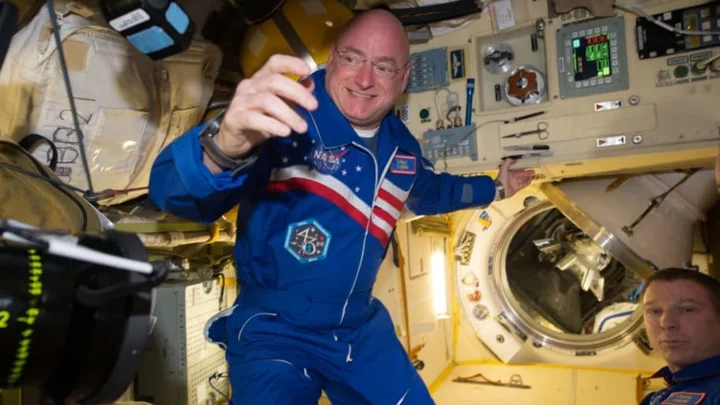When you agree to be part of a yearlong space study, you forfeit some right to privacy. In astronaut Scott Kelly’s case, the changes his body endured while spending a year at the International Space Station (ISS) were carefully analyzed by NASA, then published in a scientific journal for all to see. Kelly submitted blood samples, saliva samples, and cheek swabs. Even his poop was subjected to scrutiny.
As PBS reports, Scott Kelly’s fecal samples revealed that his gut microbiome underwent significant but reversible changes during his time in orbit. In what was surely good news for both Kelly and NASA, his gut bacteria didn’t contain anything “alarming or scary,” according to geneticist Martha Hotz Vitaterna, and it returned to normal within six months of landing on Earth.
Even after being subjected to the challenging conditions of space, “Scott’s microbiome still looked like Scott’s microbiome, just with a space twist on it,” said Vitaterna, who was one of the study’s authors.
The fecal probe was one small part of a sweeping NASA study that was just published in the journal Science, more than three years after Kelly’s return. Dubbed the Twins Study, it hinged on the results of Kelly’s tests being compared with those of his identical twin, retired astronaut Mark Kelly, who remained on Earth as the control subject.
NASA’s goal was to gain insight into the hazards that astronauts could face on proposed long-term missions to the Moon and Mars. The agency has gone to great lengths to get this information, including offering to pay people $18,500 to stay in bed for two months in order to replicate the conditions of anti-gravity.
It also explains why NASA was willing to launch unmanned rockets into space to collect samples of Kelly’s poop. On four different occasions at the ISS, Kelly used cotton swabs to pick up poo particles. When the rockets arrived to drop off lab supplies, they returned to Earth with little tubes containing the swabs, which had to be frozen until all of the samples were collected. The process was tedious, and on one occasion, one of the SpaceX rockets exploded shortly after it launched in 2015.
The study also found that his telomeres, the caps at the ends of chromosomes, had lengthened in space, likely due to regular exercise and a proper diet, according to NASA. But when Kelly returned to Earth, they began to shorten and return to their pre-spaceflight length. Shorter telomeres have a correlation with aging and age-related diseases. “Although average telomere length, global gene expression, and microbiome changes returned to near preflight levels within six months after return to Earth, increased numbers of short telomeres were observed and expression of some genes was still disrupted,” researchers wrote.
Researchers say more studies will be needed before they send the first human to Mars. Check out NASA's video below to learn more about what they discovered.
[h/t PBS]
This article was originally published on www.mentalfloss.com as NASA Reveals How Living in Space for a Year Affected Scott Kelly’s Poop.

